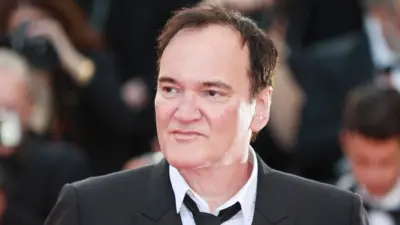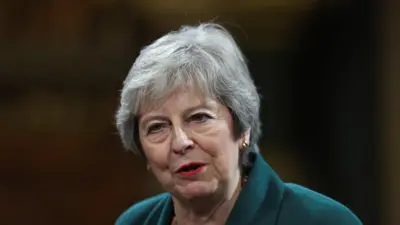We've updated our Privacy and Cookies Policy
We've made some important changes to our Privacy and Cookies Policy and we want you to know what this means for you and your data.
Political Thinking: Nadine Dorries on the tough times that shaped her political life
- By Nick Robinson
- Presenter, Political Thinking
She's published fifteen novels. She's sold more than two and half million books. Nevertheless, the appointment of Nadine Dorries as secretary of state for culture was not greeted with joy by many in the arts and the media world.
Indeed, many feared - and still fear - that the Conservative MP for Mid Bedfordshire is hostile to pretty much all that they stand for.
That doesn't appear to faze Ms Dorries, who is no stranger to fights with her opponents inside as well as outside her party.
When I interviewed her for the Political Thinking podcast, a series of conversations with - rather than interrogations of - those who shape our politics, I wanted to understand what makes her tick and what explains her anger with those she sees as a self-serving, out-of-touch "metropolitan elite".
The answer lies, as it so often does, in a pride in her roots and a history of feeling patronised by those whose upbringing was more secure, and more privileged, than her own.
Ms Dorries still remembers the poverty and the hunger she experiences in Liverpool - the backdrop for her best-selling novels.
In our conversation, she recalled the daily struggle to make ends meet.
"I remember the rent man knocking on my door and my mum was at the sink and she grabbed me by the hand and we were just on the floor so he couldn't see us through the window, if you looked through the window.
"And also, you know, going to the rent office with my mum and holding my brother's hand and watching - stood head high with this wooden counter - while she was pleading with the rent man not to evict us and telling him she was going to get work and that we would be able to pay the rent arrears.
"And I remember the tension. I remember feeling the tightness in my chest, as a six-year-old, that we were in a really serious situation. Something awful was happening."
'Posh boys'
Her books suggest a good deal of nostalgia for the values of that time, for the support families and communities gave to each other before they could rely on the state to intervene.
Image source, WPA Pool
Dorries needed that support when she experienced a series of family tragedies - a cousin who took his own life, a brother who died in a car crash and a father who, tragically, she found dead at home alone, as she ended a week of night shifts as a nurse.
Those tragedies shaped her, she told me, and they shape her still, even though the "really awful times" are hopefully behind her.
"You are still always waiting for life to just smack you in the face" she added, and it has probably made her adopt a "slightly defensive" attitude at times.
Defensive is not the word most would use to describe Ms Dorries.
I put it to her that she's seen as aggressive - always ready to rush on to Twitter to describe her opponents as liars or cheats.
She clashed repeatedly with former Prime Minister David Cameron and his Chancellor George Osborne when they were "modernising" her party - a direction of travel she loathed.
She called them "arrogant posh boys," with no idea about the price of milk, and accused them of not caring.
'Human being'
How, I asked her, could she attack them for being posh given that she now says she has undying loyalty to the posh public school boy Boris Johnson?
Her explanation was very revealing - Mr Cameron and Mr Osborne had patronised her, while Mr Johnson had treated her kindly.
Image source, Getty Images
"When I arrived in Westminster he [Mr Johnson] couldn't have been more welcoming - to all of us in the new intake in 2005. Couldn't have been more open, couldn't have been more friendly or helpful.
"I couldn't say that about David Cameron or George Osborne. I felt like I was expected to feel as though I was talking to greatness, right?
"I felt as though I should feel lucky to be in their company or that they were giving you their time.
"Whereas Boris wasn't like that one little bit. And right from the beginning there was a fundamental difference. He was a a kind human being."
Ms Dorries cried when JMr Johnson felt forced to pull out of the race to become Tory leader in 2016.
She is always the first to defend him when he's under fire.
Head or heart?
He rewarded her with a job in the cabinet - a job which brings with it the responsibility to deliver a Tory promise that five previous culture secretaries have failed to deliver over a six-year period.
She is promising to clean up social media - to fine tech firms that don't tackle online harm.
The Online Safety Bill is welcomed by many but attacked by some Conservatives as an "online censorship bill", which will give too much power to foreign tech billionaires and domestic regulators.
I put it to her that her passion is perhaps connected with her own experience of abuse online - grotesque death threats, including one from a man who said he wanted to see her burn to death in a car. She insisted that was not the case.
"It's always been about kids for me, you know, even as a nurse, even in my (childcare) business," she told me.
In her previous role, as mental health minister, she had to read reports about young people taking their own lives after being bullied on social media. The bill, she said, is a chance to stop "this stuff happening to kids".
If she delivers this and the five other bills her department has responsibility for in the Queen's Speech, the culture secretary may get time to promote her next novel - the story of a woman torn between head and heart.
I ended our conversation by asking the woman who has faced derision for getting her facts wrong and not knowing her ministerial brief whether she follows her head or her heart.
"To my detriment, to my huge fault, I follow my heart probably too often. And, you know, that makes me not a clever politician because most politicians follow their head.
"And, you know, if I haven't learnt to change and to alter that balance after 17 years, I don't think I'm ever going to. So I may as well give up trying."
You can listen to Political Thinking: The Nadine Dorries One on BBC Sounds
Top Stories
Features & Analysis
Most read
Content is not available








